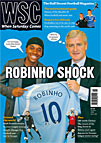 Journalist Terry Daley used to work for Chelsea – at least when it suited the club. It seems Roman learnt a few tricks from Pravda…
Journalist Terry Daley used to work for Chelsea – at least when it suited the club. It seems Roman learnt a few tricks from Pravda…
“This must be your dream job, I bet your dad must be really proud of you,” is the first thing almost everyone said to me after they found out that I was working for Chelsea’s official publications. To nodding heads and blank stares I’d point out that the money was terrible, the people above me had no idea what fans wanted, didn’t care what they had to say and had less of an idea of what made a good magazine. The response was the same almost every time: “Still, Chelsea eh? And what happened with Mourinho? Go on, tell us.”
I was not in fact an employee of the club but of a publishing house contracted to produce all Chelsea publications, including the official magazine and programme, the yearbook, media guide, staff newsletter, Youth Cup programmes and anything else that the club decided we were doing, usually at the last minute. The publishers also had a contract with the Football League, so leading up to the Carling Cup final I was sub‑editing a truly appalling programme article on Joe Cole by a noted broadsheet journalist that began: “If the ball could talk, it would flirt with Joe Cole.” The writer was so outraged by my “censoring” of his article, he demanded his name be taken off it. If anything, he owes me a pint for making his love letter readable.
Although we were based in the same offices as the rest of the media department in the Shed End, we were only part of the “Chelsea Family” when it suited them. If there was a piece of marketing nonsense that had to be done, it was plonked on our desks in the middle of a double deadline day, but when it came to the Champions League final, which the club were paying to take staff out to, we were told we couldn’t go because we weren’t Chelsea employees. The club later reversed that decision, only for the magazine staff to be told they had to stay in the UK so they could produce the play-off final programmes. Thankfully I’d left by then and made my own plans.
Consequently there was a feeling of detachment from what was going on at the club and this translated into our work. It didn’t help that there was practically no freedom of expression. Anything that could be considered criticism of the club or players was scrubbed out. Players were “unlucky” to miss from two yards, we weren’t allowed to say they missed an “easy” chance or that possession had been “wasted”; almost any reference to red or yellow cards was strictly forbidden, let alone diving or barracking of referees. Our report of the 2007-08 Community Shield mentioned that we had lost another penalty shootout. The club said that “another” should be taken out as it implied that we had a problem with shootouts, despite the fact we do. We were told not to use a story about a run in aid of Cancer Research because they weren’t Chelsea’s official charity partner, CLIC Sargent, and were therefore a “rival” cancer charity.
In Bridge News and Onside, the scruffier but much more informative magazines that preceded the shiny and glossy newer publications, the letters pages had been a great source of dialogue between the club and supporters. Now, however, they are little more than propaganda sheets; instead of talking to their existing fans directly, they’re trying to lure new fans around the world with bland features on star players.
The most extreme example of how much the club have changed in the past five years was José Mourinho’s departure. That day I had to dodge numerous TV and radio crews on the way to the ground, but in our office it was almost as if nothing had happened. Any questions about what had happened were blanked, with our only communication coming via the official club press release. My phone was ringing off the hook with people wanting to know what was going on, but if anything I had less idea than them – at least they could see what the TV news was reporting. Essentially we were told by the club that we didn’t need to know what had happened. Oh, and could we beef up Avram Grant’s CV as he’s the new manager?
To give you an idea of just how seriously they take themselves in the Chelsea bubble, they circulated an email to all employees about the new head of media, Steve Atkins. “Steve is currently Deputy Press Secretary at the British Embassy in Washington,” it read. “Steve will be a fantastic addition to our team as he brings with him a wealth of experience dealing with complicated issues and the most high profile personalities at a strategic, pro-active and reactive daily media level. That makes him ideal for Chelsea where we face our own daily and longer term challenges.”
Why on earth they need someone who has dealt with the international press and politics on the world stage to tell Martin Samuel that he needs to keep his trap shut and that no, Brian Woolnough, you can’t ask about Player X’s kiss-and-tell scandal is something only they can answer. Suffice to say we weren’t allowed to ask.
So, working for your club can be a pretty disillusioning experience if they’re drifting further away from their core support with each passing season. And, no, I really don’t know what happened with Mourinho.
From WSC 260 October 2008